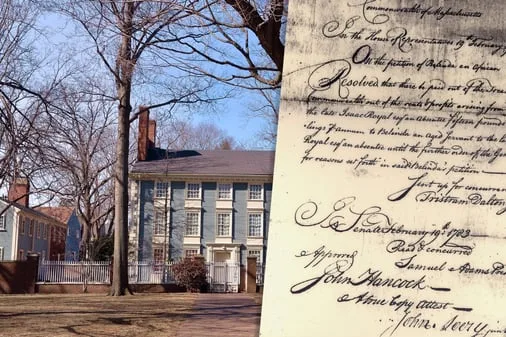
On February 14, 1783, Belinda Sutton, a formerly enslaved woman living in Medford, Massachusetts, petitioned the state legislature for a pension from the proceeds of her enslaver’s estate. In the document, Sutton, then nearly 70 years old, recounted her early life in Ghana, where slavers kidnapped her when she was twelve years old, and the decades she spent enslaved in the house of Isaac Royall.
A British Tory, Royall fled to Nova Scotia days before the Battle of Lexington. In his will, he offered freedom to Belinda and also promised monetary support. He died in 1781, and Belinda was now taking her case to the state: “The face of your Petitioner is now marked with the furrows of time, and her frame bending under the oppression of years, while she, by the Laws of the Land, is denied the employment of one morsel of that immense wealth, apart whereof hath been accumulated by her own industry, and the whole augmented by her servitude.”
The Massachusetts legislature awarded Belinda an annual sum of 15 pounds and 12 shillings—one of the first reparations cases in the United States. But, just like the 40 acres that were due to newly freed Black Americans after the Civil War, something interfered. She repeated her petition to the legislature five times, and Belinda never received what she was owed.
A 2022 Pew Research Center survey found that 58 percent of Americans think the history of slavery in this country affects Black people in society a “fair amount.” And yet, even after the pandemic cast a burning spotlight on the country’s racial inequities in an undeniable way, 68 percent of Americans do not think the descendants of people enslaved in the U.S. should be repaid in some way, such as being given land or money.
It’s an odd inconsistency. But looking closely at the racial breakdown of that question, 77 percent of Black Americans do think the descendants of people enslaved in the U.S. should be repaid—compared with 18% of white Americans.
As a reporter for WGBH in Boston, this tension was where I found a big part of my motivation to produce What is Owed?, a new podcast about the realities of reparations in the 21st century. Despite the fact most Americans agree that slavery violated national principles of “liberty and justice for all,” reparations have long been treated as a far-flung idea and not given the dignity of serious consideration.
What is Owed? is a question that reflects the journey that a growing number of towns, cities, and states are trying to figure out as they take up the issue of reparations. In 2022, the city of Boston established a task force on reparations, one of the first of its kind. We don’t purport to know the answer in Boston or anywhere else, but what we are doing is giving a racial justice idea that is as old as America itself the dignity of curious exploration and doing it from a decidedly Black perspective.
The first episode of What is Owed? seeks to answer how Boston, a city known as both “the cradle of liberty” and one of the most racist cities in the country, ended up stepping into the reparations arena. In later episodes, we’ll explore who should get reparations, what happened when Boston tried having this conversation before, and if there is a feasible national plan for such a program.
And to be clear, the show is not just about reparations. The topic itself means we must be prepared to delve into Blackness, history, and poltics to give fuller context to the movement we see today. Our goal in making this podcast is to help Black people feel seen, affirmed, and inspired by the truth: that our national status quo of dismissing the injustice done to their ancestors doesn’t have to persist. When we think hard about the feasibility of reparations, it’s clear America can make other choices.
We know our podcast will not heal the question of whether the nation will address how it has hurt some its citizens. We can only hope that we are giving folks who think it is a wrong worth righting a place to start.
New episodes of What is Owed? will be released every Thursday. Find the first episode here, and be sure to subscribe.
Saraya Wintersmith is the host of What is Owed? and covers Boston City Hall for GBH News. Before that, she covered the Dorchester, Roxbury and Mattapan neighborhoods, focusing on how people live and the issues that shaped those communities.

